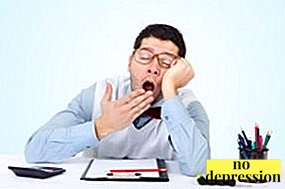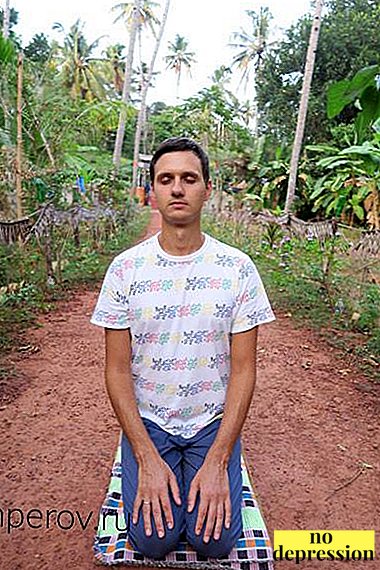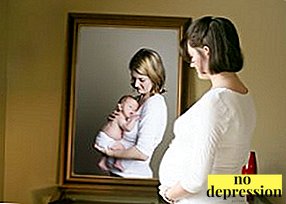 Treatment of depression is a process that requires a lot of time and effort. However, lack of treatment can threaten a person’s disintegration and premature death. That is why patients who have applied for help and have been cured of depression often talk about the “second birth”. We explain how the treatment process usually proceeds.
Treatment of depression is a process that requires a lot of time and effort. However, lack of treatment can threaten a person’s disintegration and premature death. That is why patients who have applied for help and have been cured of depression often talk about the “second birth”. We explain how the treatment process usually proceeds.
Depression can and should be treated. In most cases, it is treatable. We recommend to consult a doctor if you are suspicious.
Depression is an extremely unpleasant thing, but no one is immune from it. Today there are many methods of treatment, and in 98% of cases - at any stage. The most important thing is to consult a specialist when the signs of depression begin to show. And already depending on the severity of the disease, the doctor will recommend appropriate treatment, be it medication or an alternative one.
Stages of treatment
According to modern approaches, the treatment of long-lasting depression should be carried out in three stages:
- Survey
- Active therapy of a depressive episode.
- Supportive treatment.
- Preventive treatment.
Examination is one of the main stages of treatment, since during the examination it becomes clear to the specialist how to choose a scheme for effective control of the disease. The most common combination is medication and psychotherapy. Sometimes the patient should be urgently hospitalized, or, conversely, get by with natural sedatives.
The stage of active therapy is always started with the use of antidepressants of the newest generation and psychotherapy, in order to achieve the effect as soon as possible with the minimum of side effects.
Next is the result. If the patient has depressed mood, suicidal thoughts and attempts, the amount of medication increases and the dynamics can be traced for 6 weeks. If the dynamics was not positive, then add new drugs to the available drugs to enhance the effect. Improved should occur within 3-4 weeks.
The criterion of success of treatment is considered to be a marked improvement in the patient's condition after 3-4 weeks from the start of therapy.
People with moderate and mild depression can take these drugs and go through a stage of active treatment at home, while people with severe depression have the best time to go to hospital. This is done in order to be constantly supervised by specialists who can at any time adjust treatment, replace or prescribe new drugs.
At the supporting stage, people with moderate and mild depression are prescribed medications in therapeutic doses to support the action of antidepressants. Also, they require constant visits to the doctor, for fixing the positive dynamics.
People with severe depression continue to be in the hospital, on a reduced dose of medication. As a rule, during maintenance treatment, psychotherapy sessions are prescribed for them in order to enhance the effect of antidepressants.
For people with all forms of depression, this stage lasts from 3 months to six months.
During prophylactic treatment, antidepressants are prescribed in their minimum dosage, so that the months spent on active and supportive therapy are not in vain. Prevention is carried out for at least six months. Indeed, with the complete rejection of antidepressants, a relapse may begin, and in an even more complex form than was originally. Therefore, doctors are advised to keep records of medication intake and at least once a month to visit a specialist for examination and possible recommendations.
Therapy without pills
Therapy for treating depression with non-pharmacological agents is divided into two main categories - psychotherapy and alternative methods. Alternative methods are suitable for treating mild depression, or they can be used in addition to basic therapy. However, you should not try to cure your illness yourself, but rather go to a doctor.
Psychotherapy is of the following types:
- cognitive behavioral therapy. The doctor corrects with the help of various techniques of thought of the patient. As a result, the patient changes his point of view regarding the negative things happening in his life to a more optimistic position.
- interpersonal therapy. The bottom line is that the patient re-learns to communicate with their loved ones - to tell them about their problems and open up. This type of therapy is suitable for patients who have experienced a serious social upheaval or change - divorce, retirement, demotion at work, etc.
- psychodynamic therapy. Based on a change in attitudes towards the causes of depression — childhood injuries, past mistakes, etc. It is suitable for people who are fixated on their past, and a specialist will help you move to the next level of thinking.
- existential therapy. The attending physician helps to find new goals and dreams for his patient, forming the ability to move forward. This method is well suited for people whose cause of the disease was self-doubt;
- gestalt therapy. Every person has some unfinished action due to which the patient is experiencing. The specialist will help to understand how you can complete this action, so that the patient ceases to feel incompleteness.
 Alternative methods include:
Alternative methods include:
- Any physical activity without self-abuse. Sports provoke the release of the body's hormones of happiness - endorphins. It is believed that with an increase in the content of this hormone in the body, a person is able to get out of a mild form of depression.
- "Updating" the receptors and cleansing the body with the help of plant and natural food. A few days and the body will thank you, producing a portion of the hormones of joy, and you will feel real lightness. But, only without self-abuse and scourging yourself, only out of love!
- Changing environment. In the literal sense - to change for a while the place of residence, or move for a week to another city or a cruise by sea, it does not matter, the main thing is to nullify the perception and make room for new impressions and emotions. Bolder!
- Emotional explosion (maybe not one!). Very often, depression occurs because a person holds emotions in himself and the process of passive aggression begins. To play all the destructive emotions, choose the way that you like. It could be anything. From banal shouts and boxing to writing a novel and songs. It is important that in the process of creativity just ungraded emotions serve as fuel.
- Love to yourself. To such as you are. Anyone. In the point of development and in the weight in which you are here and now. There is no other life and no other body. Remember this. You need love and acceptance, as in the air. Do not hurt yourself.
Conclusion
Treat depression can and should be! The main thing is not to panic when its signs are detected, but to immediately consult a doctor. He will help to understand the causes of depression and prescribe an effective treatment that will help get out of mental imbalance and begin to live consciously.
We also recommend that you read the following articles:



